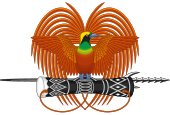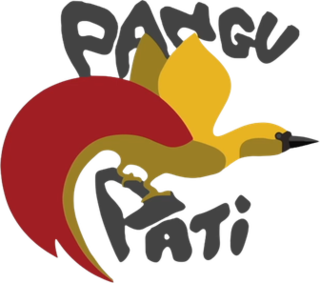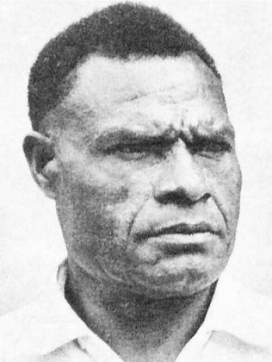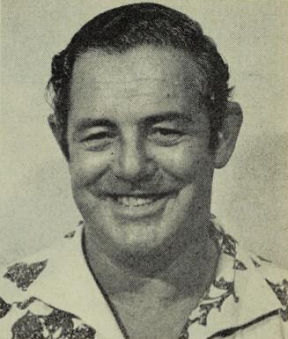 |
|---|
General elections were held in the Territory of Papua and New Guinea between 17 February and 16 March 1968. [1]
 |
|---|
General elections were held in the Territory of Papua and New Guinea between 17 February and 16 March 1968. [1]
Constitutional developments prior to the elections saw the House of Assembly expanded from 64 members to 94. The number of members elected from general constituencies was increased from 44 to 69; the ten reserved constituencies (for non-indigenous candidates) were replaced by 15 regional constituencies in which candidates had to have at least at Intermediate Certificate of education, and the number of 'official' members (civil servants) remained at ten. [2] The elections were held using instant-runoff voting. [1]
An additional residency requirement for non-indigenous candidates was introduced; candidates had to have lived in the territory for at least five years before nomination day. [3] This requirement was waived for incumbent MHAs, allowing Tony Voutas (elected in a 1966 by-election) to defend his seat. [4]
A total of 484 candidates contested the 84 seats, with around 50 running in the 15 regional constituencies. [5] Six political parties were involved; the All People's Party, the National Progress Party, the New Guinea Agriculture Reform Party, the Pangu Party, the Territory Country Party and the United Democratic Party. [5]
Four constituencies had only one candidate, who were returned unopposed (Tei Abal in Wabag, Wesani Iwoksim in Upper Sepik, Paul Langro in West Sepik Regional and Ron Neville in Southern Highlands Regional). [5]
The main campaign issues in urban areas were wages and housing. In rural areas, the campaign focussed on improved agriculture and infrastructure. [6]
Only 22 of the 46 incumbents MHAs who stood for re-election were successful. The candidate leading in the first count was elected in 71 of the 80 contested seats. In Gumine, the candidate who finished sixth in the first count was elected after preferences were counted. Four under-secretaries lost their seat, including Zure Makili Zurecnuoc. [7]
Although party affiliations were unclear, the Pangu Party was thought to have the most seats (between 12 and 20), with the All People's Party finishing second. The National Progress Party and United Democratic Party failed to win seats. [7]
Following the elections, John Guise was elected Speaker, defeating Mick Casey and Roy Ashton. [8] Seven ministerial members and eight assistant ministerial members were appointed by a House committee. [9]
| Ministerial members | |
|---|---|
| Position | Member |
| Agriculture, Stock and Fisheries | Tei Abal |
| Education | Matthias Toliman |
| Labour | Toua Kapena |
| Posts and Telegraphs | Sinake Giregire |
| Public Health | Tore Lokoloko |
| Public Works | Roy Ashton |
| Trade and Industry | Angmai Bilas |
| Assistant – Cooperatives | Lepani Watson |
| Assistant – Forests | Siwi Kurundo |
| Assistant – Information and Extension Services | Paul Langro |
| Assistant – Lands Surveys and Mines | Andrew Wabiria |
| Assistant – Local Government | Kaibelt Diria |
| Assistant – Rural Development | Meck Singilong |
| Assistant – Technical Education and Training | Joseph Lue |
| Assistant – Treasury | Oala Oala-Rarua |

The prehistory of Papua New Guinea can be traced to about 50,000–60,000 years ago, when people first migrated towards the Australian continent. The written history began when European navigators first sighted New Guinea in the early part of the 17th century.

The Pangu Pati, also known as the Pangu Party or Papua and Niugini Union Pati, is a political party in Papua New Guinea. As of September 2019, the party had 23 of 111 seats in the National Parliament.

General elections were held in Papua New Guinea between 18 June and 9 July 1977, the first since independence from Australia in 1975. The Pangu Party led by Prime Minister Michael Somare emerged as the largest in the National Parliament. Somare subsequently formed a coalition government with the People's Progress Party (PPP) and several independent MPs. Voter turnout was 60.3%.

General elections were held in Papua New Guinea between 5 and 26 June 1982. The result was a victory for the Pangu Party, which won 51 of the 109 seats. Voter turnout was 52%.

General elections were held in Papua New Guinea between 13 June and 4 July 1987. The Pangu Party emerged as the largest party, winning 26 of the 109 seats. Voter turnout was 73.5%.
John Pasquarelli is an Australian former politician. He served as a member of the House of Assembly of Papua and New Guinea from 1964 to 1968, and as an advisor to One Nation leader Pauline Hanson.
Nicholas Brokam was a Papua New Guinean politician. He was a member of the Legislative Council and House of Assembly between 1961 and 1968, also serving as Under-Secretary for Economic Affairs and Information and Extension Services.

General elections were held in the Territory of Papua and New Guinea between 19 February and 11 March 1972. They saw the election of the country's first female MP, Josephine Abaijah.

General elections were held in the Territory of Papua and New Guinea on 18 March 1961. Indigenous members were elected for the first time, although on an indirect basis. The territory's first political party, the United Progress Party, won three seats.

General elections were held in the Territory of Papua and New Guinea between 15 February and 15 March 1964. They were the first elections in the territory held under universal suffrage. Voter turnout among enrolled voters was 65%.

Makain Mo was a Papua New Guinean chief and politician. He served as a member of the House of Assembly between 1964 and 1968.

Donald Barrett was an Australian planter, army major, politician and sports coach in the Territory of Papua and New Guinea. He served as a member of the Legislative Council and House of Assembly in two spells between 1951 and 1968.

Atiheme Kimi was a Papua New Guinean politician. He served as a member of the House of Assembly between 1972 and 1973.

Matthias Tutanava Toliman was a Papua New Guinean politician. He served as a member of the House of Assembly between 1964 and 1973, also holding ministerial roles from 1964 until 1972.
Oala Oala-Rarua was a Papua New Guinean educator, civil servant, trade unionist, politician and diplomat. He served as a member of the House of Assembly and Assistant Minister for the Treasury between 1968 and 1972, later becoming the first Lord Mayor of Port Moresby and High Commissioner to Australia.

Ronald Thomas Dalton Neville was an Australia-born Papua New Guinean politician and businessman. He served as a member of the House of Assembly and National Parliament from 1964 to 1977.

Sir Pita Simogun was a Papua New Guinean policeman, farmer and politician. He served as a member of the Legislative Council from 1951 to 1961 and then as a member of the House of Assembly from 1964 to 1968, during which time he was also Parliamentary Under-Secretary for Police.

General elections were held in Papua New Guinea from 4 to 22 July 2022 to elect the members of the National Parliament for a new five-year term.

Sir Pita Lus was an outspoken Papua New Guinean politician who played an important role in the country's independence in 1975 and is credited with having persuaded Michael Somare, the country's first prime minister, to run for parliament.
Vin ToBaining was one of the first six elected indigenous members of the colonial-era Legislative Council of Papua and New Guinea, between 1961 and 1963. Subsequently, he was involved in the formation of the Pangu Party in 1967, which went on the form the government of Papua New Guinea (PNG) when the country became independent in 1975.